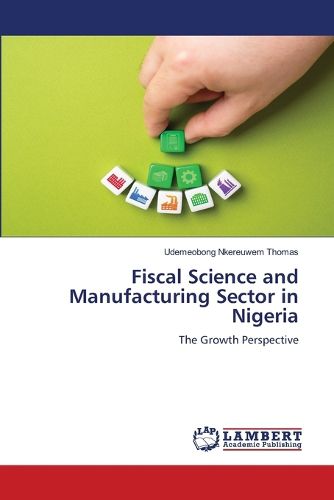Readings Newsletter
Become a Readings Member to make your shopping experience even easier.
Sign in or sign up for free!
You’re not far away from qualifying for FREE standard shipping within Australia
You’ve qualified for FREE standard shipping within Australia
The cart is loading…






This title is printed to order. This book may have been self-published. If so, we cannot guarantee the quality of the content. In the main most books will have gone through the editing process however some may not. We therefore suggest that you be aware of this before ordering this book. If in doubt check either the author or publisher’s details as we are unable to accept any returns unless they are faulty. Please contact us if you have any questions.
Fiscal Management is Fiscal Engineering likewise...the ways that seem efficient are dependent upon the indices of growth and development in any econonomy (as Nigeria's is not an exemption). Therefore, let's explore the dynamics and prospects of the subject matter in the context of Nigeria today, tomorrow, and thereafter.Recently, government policies began to show more concern on the management and improvement of the economy. Government over the years have embarked on various macroeconomic policy options to grow the economy in terms of growth and development and the policy option employed is that of fiscal policy (Peter and Simeon, 2011). Fiscal policy is the use of government revenue collection (taxation) and expenditure (spending) to influence the economy. The two main instruments of fiscal policy are government taxation and government expenditure. It can also be seen as government spending policies that influence macroeconomic conditions. These policies affect tax rates, interest rates and government spending, in an effort to control the economy.
$9.00 standard shipping within Australia
FREE standard shipping within Australia for orders over $100.00
Express & International shipping calculated at checkout
This title is printed to order. This book may have been self-published. If so, we cannot guarantee the quality of the content. In the main most books will have gone through the editing process however some may not. We therefore suggest that you be aware of this before ordering this book. If in doubt check either the author or publisher’s details as we are unable to accept any returns unless they are faulty. Please contact us if you have any questions.
Fiscal Management is Fiscal Engineering likewise...the ways that seem efficient are dependent upon the indices of growth and development in any econonomy (as Nigeria's is not an exemption). Therefore, let's explore the dynamics and prospects of the subject matter in the context of Nigeria today, tomorrow, and thereafter.Recently, government policies began to show more concern on the management and improvement of the economy. Government over the years have embarked on various macroeconomic policy options to grow the economy in terms of growth and development and the policy option employed is that of fiscal policy (Peter and Simeon, 2011). Fiscal policy is the use of government revenue collection (taxation) and expenditure (spending) to influence the economy. The two main instruments of fiscal policy are government taxation and government expenditure. It can also be seen as government spending policies that influence macroeconomic conditions. These policies affect tax rates, interest rates and government spending, in an effort to control the economy.